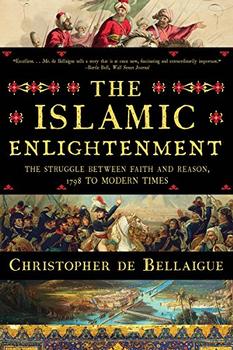Summary | Excerpt | Reviews | Beyond the Book | Readalikes | Genres & Themes | Author Bio
The Struggle Between Faith and Reason, 1798 to Modern Times

Critics' Opinion:
Readers' Opinion:
First Published:
Apr 2017, 432 pages
Paperback:
Aug 2018, 432 pages
 Book Reviewed by:
Book Reviewed by:
Lisa Butts
Buy This Book
A century later on, Jabarti's benighted country had changed to such an extent that its senior judicial authority, the cleric Muhammad Abduh, was an admirer of Darwin, corresponded with Tolstoy (who had been excommunicated from the Russian Orthodox Church) and used his knowledge of European languages to absorb as much as he could of infidel learning.
By the First World War, under the influence of Abduh and others like him, a liberal modernising tendency had emerged strongly in the three intellectual and political centres of the Middle East, Egypt, Turkey and Iran, attracting ideas that in turn spun off into the adjacent regions. Political consciousness had taken flight and political and national aspirations were increasingly aimed at securing that universal symbol of political liberalism, the democratically elected legislature, without which no regime could enjoy legitimacy.
Yet the onset of war and its devastating consequences emboldened opponents of liberalism and progressive thought who began to strike back vigorously. In 1919 the Treaty of Versailles, under which the victorious allies divided the spoils and imposed punitive reparations on Germany, also formalised the end of the Ottoman Empire. The Muslim lands were scattered and many entered the imperialist inventory of Western powers, while following the Second World War, despite a strong current of anti-colonialism, they became a Cold War battleground where the two blocs competed for influence. In the light of this mass subjugation and manipulation, it is not surprising that many Muslims sought political means to express their hatred of the West.
The First World War was a watershed in the history of the Islamic Enlightenment. Before the conflict the region had been moving towards modernity and the adoption of liberal, secular values. Now this movement was arrested and the revulsion of Muslims for colonial exploitation found expression in ideologies of resistance.
The rise of such ideologies and their mutation into violence begs an important question which bears directly on the Islamic Enlightenment. If Islam engaged so successfully with modernity until the First World War, why since then has reactionary revivalism been able to impose itself on ever larger swathes of the Muslim world?
Political Islam – Islamism, properly known – is an ideology that started as an anti-imperialist, and later also an anti-Communist, response to the carve-up of the Middle East, providing an outlet for a common fear among Muslims that the region would fall irrevocably to one or other of these all-absorbing ideologies. Radical Islam grew out of this, an unappetising millennialism that the vast majority of Muslims recognise but dimly. The violence and ignorance that we often see today being glorified by a minority of Muslims should in fact be seen as blowback from the Islamic Enlightenment – a facet, however detestable, of modernity itself.
When dealing with terms that have arisen and acquired currency in the West, such as 'modernity' and 'progress', one should exercise caution. The word 'Enlightenment' is perhaps the trickiest benchmark of all because it comes with its own baggage of self-congratulation. The Enlightenment of Sir Isaac Newton; the Lumières of France; the Auf klärung of Leibniz; in whatever European language you say it, this word evokes daring and challenge to the status quo on every front, from the Cartesian affirmation of individuality to the majestic opening chords of Mozart's Magic Flute, Enlightenment opera par excellence. These brilliant events happened amid more general ferment and change: the rise of education (from which Jane Eyre would benefit), mass printing and public opinion, refinements to hygiene and domestic life (it was during the eighteenth century that the modern nuclear family began to form), worlds discovered (in the heavens; under the microscope), museums going up, feudalism coming down, and preparations being made for the modern apotheosis of the French Revolution.
Excerpted from The Islamic Enlightenment by Christopher de Bellaigue. Copyright © 2017 by Christopher de Bellaigue. With permission of the publisher, Liveright Publishing Corporation. All rights reserved.





The Funeral Cryer by Wenyan Lu
Debut novelist Wenyan Lu brings us this witty yet profound story about one woman's midlife reawakening in contemporary rural China.
Your guide toexceptional books
BookBrowse seeks out and recommends the best in contemporary fiction and nonfiction—books that not only engage and entertain but also deepen our understanding of ourselves and the world around us.